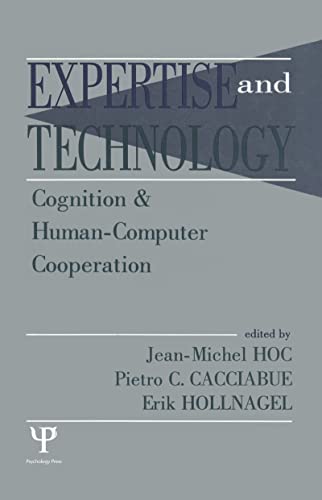Verwandte Artikel zu Expertise and Technology: Cognition & Human-computer...
Expertise and Technology: Cognition & Human-computer Cooperation (Expertise: Research and Applications Series) - Hardcover

Inhaltsangabe
Technological development has changed the nature of industrial production so that it is no longer a question of humans working with a machine, but rather that a joint human machine system is performing the task. This development, which started in the 1940s, has become even more pronounced with the proliferation of computers and the invasion of digital technology in all wakes of working life. It may appear that the importance of human work has been reduced compared to what can be achieved by intelligent software systems, but in reality, the opposite is true: the more complex a system, the more vital the human operator's task. The conditions have changed, however, whereas people used to be in control of their own tasks, today they have become supervisors of tasks which are shared between humans and machines.
A considerable effort has been devoted to the domain of administrative and clerical work and has led to the establishment of an internationally based human-computer interaction (HCI) community at research and application levels. The HCI community, however, has paid more attention to static environments where the human operator is in complete control of the situation, rather than to dynamic environments where changes may occur independent of human intervention and actions.
This book's basic philosophy is the conviction that human operators remain the unchallenged experts even in the worst cases where their working conditions have been impoverished by senseless automation. They maintain this advantage due to their ability to learn and build up a high level of expertise -- a foundation of operational knowledge -- during their work. This expertise must be taken into account in the development of efficient human-machine systems, in the specification of training requirements, and in the identification of needs for specific computer support to human actions. Supporting this philosophy, this volume
*deals with the main features of cognition in dynamic environments, combining issues coming from empirical approaches of human cognition and cognitive simulation,
*addresses the question of the development of competence and expertise, and
*proposes ways to take up the main challenge in this domain -- the design of an actual cooperation between human experts and computers of the next century.
Die Inhaltsangabe kann sich auf eine andere Ausgabe dieses Titels beziehen.
Über die Autorin bzw. den Autor
Erik Hollnagel, Jean-Michel Hoc, Pietro C. Cacciabue, P. Carlo Cacciabue
„Über diesen Titel“ kann sich auf eine andere Ausgabe dieses Titels beziehen.
EUR 6,97 für den Versand von Vereinigtes Königreich nach Deutschland
Versandziele, Kosten & DauerNeu kaufen
Diesen Artikel anzeigenEUR 10,27 für den Versand von Vereinigtes Königreich nach Deutschland
Versandziele, Kosten & DauerSuchergebnisse für Expertise and Technology: Cognition & Human-computer...
Expertise and Technology: Cognition & Human-computer Cooperation (Expertise: Research and Applications Series)
Anbieter: WeBuyBooks, Rossendale, LANCS, Vereinigtes Königreich
Zustand: Very Good. Most items will be dispatched the same or the next working day. A copy that has been read, but is in excellent condition. Pages are intact and not marred by notes or highlighting. The spine remains undamaged. Artikel-Nr. wbs1439620790
Anzahl: 1 verfügbar
Expertise and Technology
Anbieter: Majestic Books, Hounslow, Vereinigtes Königreich
Zustand: New. pp. 312. Artikel-Nr. 7505435
Anzahl: 3 verfügbar
Expertise and Technology: Cognition & Human-computer Cooperation (Expertise: Research and Applications Series)
Anbieter: Ria Christie Collections, Uxbridge, Vereinigtes Königreich
Zustand: New. In. Artikel-Nr. ria9780805815115_new
Anzahl: Mehr als 20 verfügbar
Expertise and Technology: Issues in Cognition and Human-Computer Cooperation
Anbieter: Revaluation Books, Exeter, Vereinigtes Königreich
Hardcover. Zustand: Brand New. 1st edition. 312 pages. 9.25x6.00x1.00 inches. In Stock. Artikel-Nr. x-0805815112
Anzahl: 2 verfügbar

